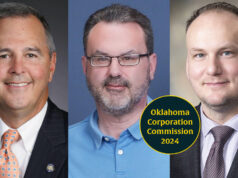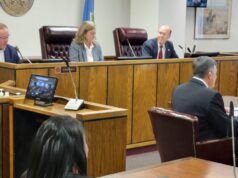

Today, Oklahoma voters will either elect a new corporation commissioner or select a final term for a 30-year incumbent. The three-member Corporation Commission regulates electric, natural gas and telecommunications utilities and oversees regulations on industries such as oil and gas.
Corporation commissioners serve staggered, six-year terms as one of three heads of the Corporation Commission. Todd Hiett serves as a commissioner and Dana Murphy serves as chairwoman. Neither is up for re-election in 2018.
Incumbent Republican Bob Anthony is being challenged by Democrat Ashley Nicole McCray and independent Jackie Short.
Anthony did not respond to multiple interview requests for this story.
McCray: ‘The fracking industry has completely taken over the state’
In an interview, McCray spoke about her bid for corporation commissioner. She is an eighth generation Oklahoman and a member of the Absentee-Shawnee tribe of Oklahoma.
“I was working on my Ph.D. I specialized in the intersections between environment and industrialization,” McCray said. “And so I’m specifically interested in seeing the impact of corporations on our environment.”
When talking about her decision to run, McCray spoke about meeting Anthony at an event they co-hosted at the Corporation Commission.
“I actually met Bob Anthony, my opponent, last year,” McCray said. “And it became very apparent through that interaction that he did not have a concern for the voice of the people of Oklahoma. He did not care about ordinary citizens and he was not fighting with the actual science that linked the injection wells to earthquakes.”
McCray talked about how her own goals align with the Corporation Commission’s strategic action plan.
“So far as the corporation commission’s internal workings are concerned, their strategic action plan for the next several years actually has a trajectory that’s very much in line with my personal platform,” McCray said. “They are interested in moving toward renewable energy.”
She emphasized that Corporation Commission experts wrote the strategic action plan, not the commissioners themselves.
“I think they actually need leadership like myself to bring a fresh set of eyes and a fresh perspective,” McCray said. “To move them forward into a direction that they’re already projecting themselves to move into.”
McCray talked at length about what she sees as the dangers of hydraulic fracturing, or fracking. She drew a distinction between horizontal wells, vertical wells and injection wells.
“A lot of people also recognize that there are a lot of harms and dangers involved in injection wells. Even as far as threatening our traditional, vertical wells, the ones we grew up with,” McCray said. “What’s happening right now is fundamentally different from the oil and gas industry we were used to growing up. The fracking industry has completely taken over the state.”
Despite her concern about fracking’s dangers, she advocated for more administrative solutions, rather than regulatory ones. By removing the process of administrative approval, McCray said, more Oklahomans could voice concerns over wells proximate to their property or water sources.
“Basically what [administrative approval] does, it is a process at the Corporation Commission that completely strips the voice and power away from Oklahomans and their communities. Unless they have the power and ability to protest individual applications going through the Corporation Commission,” McCray said. “It basically puts the entire onus of responsibility on the people of Oklahoma, and I think that’s what the problem is.”
McCray said oil companies should bear the onus of responsibility and that they should be willing to give Oklahomans a seat at the table. She referenced Texas’ mandated public comment period for new wells, saying oil companies meet with communities to gain permission before new projects.
As a tribal member, McCray said she hopes to foster relationships between the commission and tribal governments.
“Tribal sovereignty is actually good for all people, not just tribal people. I think that’s something that needs to be very clear,” McCray said. “I’ve met with several tribal leaders throughout the state. We’ve had these discussions and what I’ve learned from them is they do want to have these relationships with the state agencies, especially the Corporation Commission.”
She said better relationships with tribal governments could save the Corporation Commission time and money by using established tribal infrastructure to help it do its job.
Jackie Short: ‘I want to be a true independent voice’
Jackie Short, an independent, has been an attorney for 27 years. In an interview, she said her diverse experience best qualifies her to be a corporation commissioner.
“I have a four-year degree, I have a master’s degree and I have a doctorate, which is my law degree,” Short said. “I have also, in my undergraduate work, I got very varied as far as business, accounting, economics, you name it.”
Short said she has worked many different cases as an attorney, but focuses on environmental law. She has worked on both sides of oil and gas cases, but prided herself on being independent.
“I have worked for oil and gas companies, and I have worked for land owners,” she said. “So I feel like I’m right in the middle where I can be the voice of reason at the commission. I am not taking donations from any companies that are regulated by the commission. I want to be a true independent voice.”
Short said she thought Anthony had done a good job, but she identified a lack of public knowledge about the commission as one of her top issues.
“People I’ve talked to don’t really realize the scope the commission has, that they regulate utilities and oil and gas and pipelines and to some extent the wind industry,” Short said. “First of all, I think the public needs to be educated about what the commission does.”
In addition, Short talked about what she views as the major responsibilities of a corporation commissioner.
“[The commission] definitely has a hand in controlling injection and fracking and things like that that affect the citizens of Oklahoma,” she said. “So as far as rates and environmental issues, they have a big hand in that. So I would tell people that’s where I could come in and be a truly independent voice. ”
Short spoke on the relationship between oil and gas production and earthquakes in Oklahoma.
“My feeling was, in the beginning, that the commission said there was not a relationship there. But then I think the studies have proven that there is,” she said. “The other thing I noticed is with the decrease in that kind of activity, the amount of seismic activity decreased as well. So it does sound like there’s a nexus there.”
While she acknowledged the relationship between earthquakes and disposal wells, Short said oil and gas companies must still be able to operate.
“Where I’m coming from is (that) oil and gas companies need to operate in Oklahoma at a profit. I’m not trying to squelch them down,” she said. “They just need to be controlled in a way that protects the environment, the land belonging to the citizens of Oklahoma. I think there is a medium in there that can be achieved.”
Bob Anthony: 30 years on the job
NonDoc could not secure an interview with incumbent Corporation Commissioner Bob Anthony. He also did not participate in a Republican runoff-primary debate in August. He has held the position since 1988 as a Republican.
Anthony’s policy positions lie at the intersection of consumer protections and deregulation. His website states he wants to reduce utility costs, promote natural gas in vehicles, homes and businesses, reduce regulatory burdens and bring wind power to the state.
Anthony also states he wants to enforce the “toughest ethics code of any state agency.”
He holds a bachelor of science degree from Wharton School of Finance at the University of Pennsylvania and master’s degrees from the London School of Economics, Harvard and Yale. He served in the U.S. Army Reserve.
Before being elected to the Corporation Commission, Anthony was president of the C.R. Anthony Company.




















